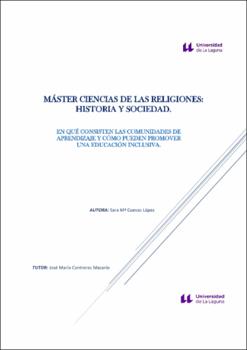En qué consisten las comunidades de aprendizaje y cómo pueden promover una educación inclusiva
Autor
Cuevas López, Sara MariaFecha
2021Resumen
Una de las principales funciones de la escuela del siglo XXI es atender a la diversidad y
pluralidad del alumnado, en todos los aspectos, incluida la diversidad cultural tan
presente en la actualidad. Para ello hay que modificar la intervención educativa y
transformar las aulas en aulas inclusivas donde todos los alumnos tengan derecho y
puedan llegar a disfrutar de una educación de calidad a lo largo de su etapa escolar.
El trabajo a través de las comunidades de aprendizaje es un ejemplo de centros
educativos innovadores capaces de atender a la diversidad, en todos sus sentidos, desde
una visión más inclusiva y social, donde se elaboran propuestas con el fin de eliminar el
fracaso escolar, de atender las diferencias, y de llevar a cabo un enfoque educativo que
permita abordar las expectativas e inquietudes que el alumnado demanda, todas ellas
contribuyentes a la mejora educativa.
En este trabajo de investigación, nos centraremos en la diversidad cultural existente en
los centros educativos y en el estudio de las Comunidades de Aprendizaje conociendo
cuales son las principales características que las definen, así como las ventajas que tiene
trabajar a partir de este proyecto y como pueden contribuir de forma positiva a la
educación intercultural. Para ello nos centraremos en el estudio y análisis de un colegio
de la provincia de Sevilla que desde hace ya algunos años trabajan con sus alumnos a
través de Comunidades de Aprendizaje.
Además, haremos alusión a la educación inclusiva como educación para todos y todas,
así como a las ventajas de la educación intercultural. One of the main functions of the 21st century school is to address the diversity and
plurality of students, for this we must modify the educational intervention and
transform the classrooms into inclusive classrooms where all students have the right
and can enjoy an education of quality throughout its school stage.
The work through the learning communities is an example of innovative educational
centers able to attend to diversity from a more inclusive and social perspective, where
proposals are elaborated in order to eliminate school failure, to attend to diversity, and
to carry out an educational approach that allows to address the expectations and
concerns that the students demand, all of them contributing to the educational
improvement.
In this research work, we will focus on the study of Learning Communities knowing what
are the main characteristics that define them and the advantages of working from this
project. For this we will focus on the study and analysis of a school in the province of
Seville that for some years now work with their students through Learning Communities.
Furthermore, we will refer to inclusive education as well as the advantages of
intercultural education.




